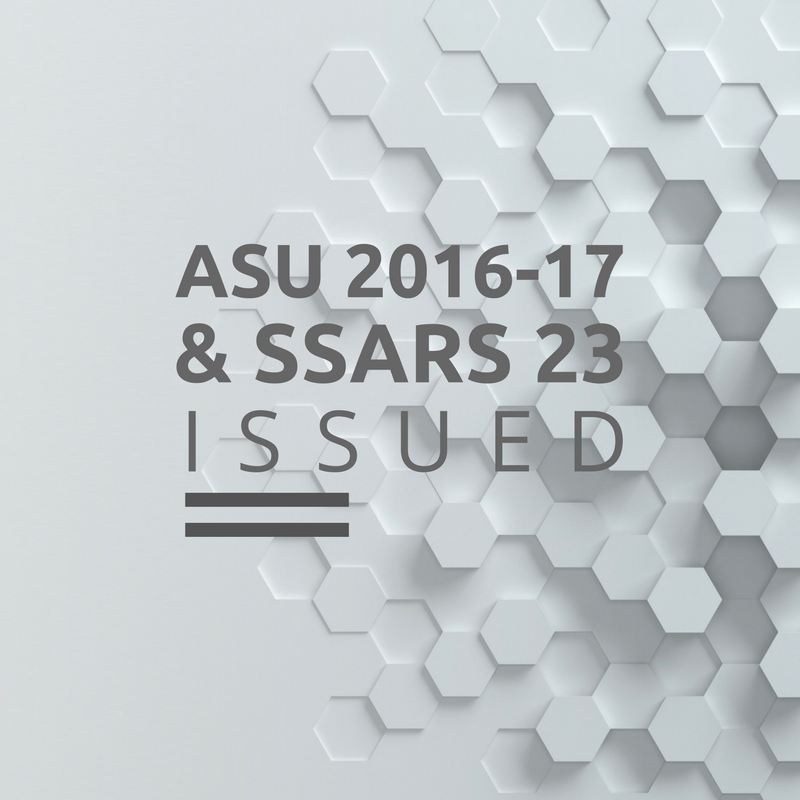Two major pronouncements were just issued, an Accounting Standards Update (ASU) issued by the Financial Accounting Standards Board (FASB) and a Statement on Standards for Accounting and Review Services (SSARS) issued by the Accounting and Review Services Committee of the AICPA.
In ASU 2016-17, Interests Held Through Related Parties That Are under Common Control, the FASB modifies the criteria used by a reporting entity when determining if it is the primary beneficiary of a variable interest entity (VIE) when there the entities are under common control and the reporting entity has indirect interests in the VIE through related parties. If the reporting entity meets the first criteria in that it has the power to direct the activities of the VIE that are most significant to its economic performance, it is required to consider all interests held indirectly through related entities in determining if it meets the second criterion, the obligation to absorb losses of the VIE, or the right to receive benefits from it that are potentially significant to the VIE.
SSARS 23 makes changes to various sections of the codified standards resulting from the issuance of SSARS 21.
Modifications to AR-C Section 60, General Principles for Engagements Performed in Accordance With Statements on Standards for Accounting and Review Services include:
- Expanding the applicability of SSARS to include engagements involving subject matter other than financial statements;
- Adds definitions of financial statements and prospective financial statements to the glossary; modifies the definitions of engagement team and professional judgment to conform to those in auditing standards; and clarifies the definition of other preparation, compilation, and review publications;
- Requires that a departure from a presumptively mandatory requirement be documented along with an indication of how alternative procedures were sufficient to achieve the requirement’s intent; and
- Eliminates the requirement that management acknowledge its responsibility for the design, implementation, and maintenance of internal control in circumstances when the accountant decides to accept those responsibilities.
Changes to AR-C section 70, Preparation of Financial Statements, include:
- Adding the preparation of prospective financial statements to the engagements to which the section applies and providing clarification to indicate when AR-C section 70 applies, when it does not apply, and when it may be applied;
- Indicates that prospective financial information may be prepared and presented in accordance with suitable criteria, in addition to the AICPA Guide, Prospective Financial Information;
- Makes it clear that an oral understanding of the terms of the engagement with the client is not sufficient and clarifies the nature of an engagement letter;
- Clarifies that the accountant may withdraw from a preparation engagement if the client is unable to include an indication that no assurance is provided; and
- Prohibits an accountant from preparing prospective information when disclosures do not identify the hypothetical assumptions or a description of the limitations on the usefulness of the presentation of the prospective financial statements.
The changes to AR-C section 80, Compilation Engagements, were:
- Adding prospective financial information, pro forma financial information, and other historical financial information to the types of subject matter that may be compiled under the standard;
- Allowing the accountant to compile prospective financial information applying SSARS when it is prepared in accordance with the AICPA Guide, Prospective Financial Information or other suitable criteria;
- Making it clear that an oral understanding of the terms of the engagement with the client is not sufficient and clarifies the nature of an engagement letter;
- Conforming requirements for the accountant’s signature on the report to those in AR-C section 90, Review of Financial Statements;
- Including requirements for compilation reports issued in relation to prospective financial information; and
- Clarifying that the accountant is required to disclose known departures form the applicable financial reporting framework in the report, provided the accountant considers the report modification to be sufficient for disclosure of the departure.
Changes to AR-C section 90, Review of Financial Statements, including:
- Clarifying that a review of any historical financial information, including pro forma financial information, is performed in accordance with SSARS;
- Clar Making it clear that an oral understanding of the terms of the engagement with the client is not sufficient and clarifies the nature of an engagement letter;
- Making it clear that an oral understanding of the terms of the engagement with the client is not sufficient and clarifies the nature of an engagement letter;
- Clarifying the definition of supplementary information;
- Making it clear that an oral understanding of the terms of the engagement with the client is not sufficient and clarifies the nature of an engagement letter;
- Changing the language regarding the requirement for the accountant’s or firm’s signature and the signature of appropriate parties from the client on the engagement letter to be consistent with the language in AR-C sections 70 and 80;
- Harmonizing the requirements for the accountant’s or firm’s signature on the review report with the language in Ar-C section 80; and
- Revising the accountant’s reporting responsibilities when supplementary information accompanies the reviewed financial statements.
Per the Journal of Accountancy:
SSARS No. 23 is effective upon issuance except for the amendments to AR-C Sections 70 and 80 with respect to prospective financial information. Those amendments are effective for prospective financial information prepared on or after May 1, 2017, and for compilation reports dated on or after May 1, 2017, respectively.
–Mark Dauberman, CPA, EMBA, Senior Editor
